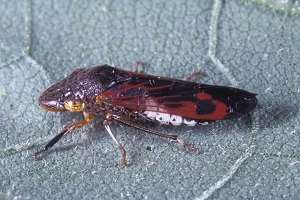By Russ Mizell
Olives, Olea europaea, are a newly-developing crop in Florida, but much still remains to be learned of the potential pests. Olives are best adapted to dry Mediterranean climates with some winter chilling. Production under Florida climatic conditions can be considered as “off-site” and plants are likely to be subjected to abiotic and biotic stressors because of elevated rainfall and humidity and additional pest and disease pressure. Plants that are stressed are often attacked by generalist insect pests such as wood borers that serve an ecological role as recyclers. In fact, predictably, a clearwing moth, the Ash borer, has been found infesting olive tree trunks in the Live Oak area.

A more troubling situation is with a known insect-spread plant pathogen, Xylella fastidiosa, that has manifested itself as a major pest and tree killer in Italy (known there as olive quick decline syndrome). Xylella fastidiosa is a bacterium that resides in the plant xylem tissue. It is transmitted almost exclusively by xylem-feeding leafhoppers and their relatives the tree and plant hoppers. Assorted strains of this bacterium are the causal agent of phony peach disease, plum leaf scald, and Pierce’s disease of grapes, citrus variegated chlorosis, and leaf scorch of almond, coffee, elm, oak, oleander, pear, and sycamore.
Diseases caused by X. fastidiosa are most prevalent in the southeastern United States, but may also occur the Northeast, Southern Midwestern states, and in California. Fortunately, the European strain known to cause olive quick decline syndrome has not been found in the U.S., but unfortunately, the main European vector identified to date, a plant hopper, Philaenus spumarius, is a common, native insect inhabiting Florida. In northern Florida, X. fastidiosa can limit peach and plum orchard life. European varieties of wine and table grape are virtually non-existent in Florida and surrounding states due to Pierce’s disease, while most muscadine grapes are resistant, but can harbor the pathogen.
Presently, because of the introduction of a new vector, the glassy-winged sharpshooter (Figure 1.), Homalodisca vitripennis, grape production in California is threatened. This leafhopper is native to the Southeastern U.S. and is found on Florida olives commonly in the summer months. Other leafhopper vectors include H. insolita, Oncometopia spp., Graphocephala spp. and Draeculacephala spp. These insects are commonly found in Florida in association with weeds, shrubs, and trees that serve as reservoirs for X. fastidiosa.
Leafhoppers can become infectious after feeding on a diseased plant for a short period of time. The bacterium colonizes and survives in structures that are part of the insect mouthparts. Once the insect has acquired the bacteria, it can be spread to subsequent plants simply by feeding (like a dirty needle would help spread human pathogens). Adult leafhoppers remain infectious for life. Leafhoppers feed and lay eggs on an extremely wide range of plant species, they are strong fliers and can feed on hosts over a large area during their long lifetime. Leafhoppers infected with X. fastidiosa have been collected almost every month of the year in Florida.
Olive growers should be aware of the potential for problems with the disease. Most likely it will be sometime, if ever, before it kills trees in Florida. However, if citrus greening is an example, the vector arrived first and then the pathogen approximately 5 years or so later. Producers should remain observant and very careful where they obtain their trees and the source of the germplasm used by nurseries. No germplasm should be transported into the U.S. illegally from outside the country. To prevent the spread of insects and diseases, please purchase trees from licensed nurseries. If you are shipping or moving trees please make sure trees are healthy and pest (and fruit) free.
Source: ufl.edu